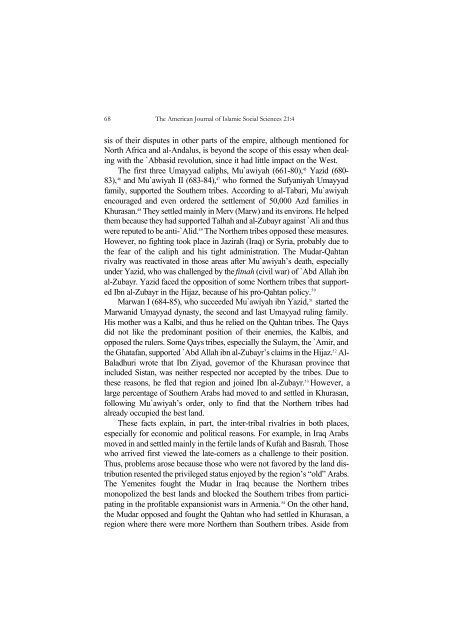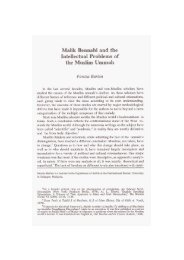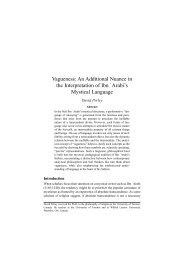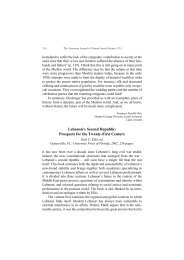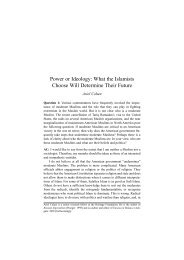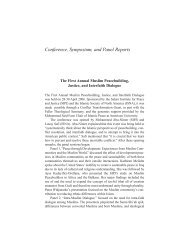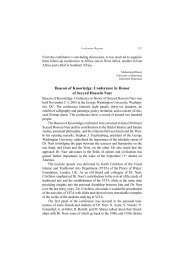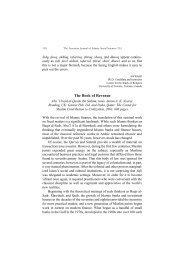Arab Tribes, the Umayyad Dynasty, and the `Abbasid ... - Epistemology
Arab Tribes, the Umayyad Dynasty, and the `Abbasid ... - Epistemology
Arab Tribes, the Umayyad Dynasty, and the `Abbasid ... - Epistemology
You also want an ePaper? Increase the reach of your titles
YUMPU automatically turns print PDFs into web optimized ePapers that Google loves.
68 The American Journal of Islamic Social Sciences 21:4<br />
sis of <strong>the</strong>ir disputes in o<strong>the</strong>r parts of <strong>the</strong> empire, although mentioned for<br />
North Africa <strong>and</strong> al-Andalus, is beyond <strong>the</strong> scope of this essay when dealing<br />
with <strong>the</strong> <strong>`Abbasid</strong> revolution, since it had little impact on <strong>the</strong> West.<br />
The first three <strong>Umayyad</strong> caliphs, Mu`awiyah (661-80), 45 Yazid (680-<br />
83), 46 <strong>and</strong> Mu`awiyah II (683-84), 47 who formed <strong>the</strong> Sufyaniyah <strong>Umayyad</strong><br />
family, supported <strong>the</strong> Sou<strong>the</strong>rn tribes. According to al-Tabari, Mu`awiyah<br />
encouraged <strong>and</strong> even ordered <strong>the</strong> settlement of 50,000 Azd families in<br />
Khurasan. 48 They settled mainly in Merv (Marw) <strong>and</strong> its environs. He helped<br />
<strong>the</strong>m because <strong>the</strong>y had supported Talhah <strong>and</strong> al-Zubayr against `Ali <strong>and</strong> thus<br />
were reputed to be anti-`Alid. 49 The Nor<strong>the</strong>rn tribes opposed <strong>the</strong>se measures.<br />
However, no fighting took place in Jazirah (Iraq) or Syria, probably due to<br />
<strong>the</strong> fear of <strong>the</strong> caliph <strong>and</strong> his tight administration. The Mudar-Qahtan<br />
rivalry was reactivated in those areas after Mu`awiyah’s death, especially<br />
under Yazid, who was challenged by <strong>the</strong> fitnah (civil war) of `Abd Allah ibn<br />
al-Zubayr. Yazid faced <strong>the</strong> opposition of some Nor<strong>the</strong>rn tribes that supported<br />
Ibn al-Zubayr in <strong>the</strong> Hijaz, because of his pro-Qahtan policy. 50<br />
Marwan I (684-85), who succeeded Mu`awiyah ibn Yazid, 51 started <strong>the</strong><br />
Marwanid <strong>Umayyad</strong> dynasty, <strong>the</strong> second <strong>and</strong> last <strong>Umayyad</strong> ruling family.<br />
His mo<strong>the</strong>r was a Kalbi, <strong>and</strong> thus he relied on <strong>the</strong> Qahtan tribes. The Qays<br />
did not like <strong>the</strong> predominant position of <strong>the</strong>ir enemies, <strong>the</strong> Kalbis, <strong>and</strong><br />
opposed <strong>the</strong> rulers. Some Qays tribes, especially <strong>the</strong> Sulaym, <strong>the</strong> `Amir, <strong>and</strong><br />
<strong>the</strong> Ghatafan, supported `Abd Allah ibn al-Zubayr’s claims in <strong>the</strong> Hijaz. 52 Al-<br />
Baladhuri wrote that Ibn Ziyad, governor of <strong>the</strong> Khurasan province that<br />
included Sistan, was nei<strong>the</strong>r respected nor accepted by <strong>the</strong> tribes. Due to<br />
<strong>the</strong>se reasons, he fled that region <strong>and</strong> joined Ibn al-Zubayr. 53 However, a<br />
large percentage of Sou<strong>the</strong>rn <strong>Arab</strong>s had moved to <strong>and</strong> settled in Khurasan,<br />
following Mu`awiyah’s order, only to find that <strong>the</strong> Nor<strong>the</strong>rn tribes had<br />
already occupied <strong>the</strong> best l<strong>and</strong>.<br />
These facts explain, in part, <strong>the</strong> inter-tribal rivalries in both places,<br />
especially for economic <strong>and</strong> political reasons. For example, in Iraq <strong>Arab</strong>s<br />
moved in <strong>and</strong> settled mainly in <strong>the</strong> fertile l<strong>and</strong>s of Kufah <strong>and</strong> Basrah. Those<br />
who arrived first viewed <strong>the</strong> late-comers as a challenge to <strong>the</strong>ir position.<br />
Thus, problems arose because those who were not favored by <strong>the</strong> l<strong>and</strong> distribution<br />
resented <strong>the</strong> privileged status enjoyed by <strong>the</strong> region’s “old” <strong>Arab</strong>s.<br />
The Yemenites fought <strong>the</strong> Mudar in Iraq because <strong>the</strong> Nor<strong>the</strong>rn tribes<br />
monopolized <strong>the</strong> best l<strong>and</strong>s <strong>and</strong> blocked <strong>the</strong> Sou<strong>the</strong>rn tribes from participating<br />
in <strong>the</strong> profitable expansionist wars in Armenia. 54 On <strong>the</strong> o<strong>the</strong>r h<strong>and</strong>,<br />
<strong>the</strong> Mudar opposed <strong>and</strong> fought <strong>the</strong> Qahtan who had settled in Khurasan, a<br />
region where <strong>the</strong>re were more Nor<strong>the</strong>rn than Sou<strong>the</strong>rn tribes. Aside from


